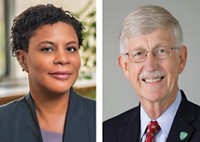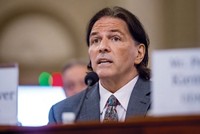Advertisement
Grab your lab coat. Let's get started
Welcome!
Welcome!
Create an account below to get 6 C&EN articles per month, receive newsletters and more - all free.
It seems this is your first time logging in online. Please enter the following information to continue.
As an ACS member you automatically get access to this site. All we need is few more details to create your reading experience.
Not you? Sign in with a different account.
Not you? Sign in with a different account.
ERROR 1
ERROR 1
ERROR 2
ERROR 2
ERROR 2
ERROR 2
ERROR 2
Password and Confirm password must match.
If you have an ACS member number, please enter it here so we can link this account to your membership. (optional)
ERROR 2
ACS values your privacy. By submitting your information, you are gaining access to C&EN and subscribing to our weekly newsletter. We use the information you provide to make your reading experience better, and we will never sell your data to third party members.
Profiles
Covid-19
Science editor in chief Holden Thorp on the role of science during the COVID-19 pandemic
The chemist and former university administrator uses editorials to speak up for science during an ‘extraordinary’ time
by Andrea Widener
April 25, 2020
| A version of this story appeared in
Volume 98, Issue 16

When Holden Thorp became editor in chief of Science in October 2019, he wasn’t planning to write editorials challenging the US president during an international crisis.
But as the current pandemic began to unfold, Thorp was triggered by President Donald J. Trump’s inaccurate comparisons of COVID-19—the disease caused by the novel coronavirus, SARS-CoV-2—to the flu and the unrealistic expectations he put on vaccine developers and pharmaceutical companies.
Thorp and his editorial team felt that Trump’s denial of what scientists had been saying “was just so dangerous that we wouldn’t be doing our job if we didn’t speak out,” he says.
And so he has, by writing a series of editorials about the role of science in addressing the pandemic. One of the editorials was widely circulated and cited in the Washington Post and the New York Times—not common for an editorial in a research journal. Thorp hopes that the editorials help researchers “contextualize this moment, which I think is extraordinary,” he says.
Science wasn’t at the heart of most of the recent crises the US has faced, Thorp says—such as the 9/11 terrorist attacks and the 2008 financial meltdown. “But this is a time when people are thinking about science in a way that they never have,” he says. “Science really needs to have a strong voice.”
Vitals
▸ Age: 55
▸ Education: BS, chemistry, University of North Carolina at Chapel Hill, 1986; PhD, chemistry, California Institute of Technology, 1989
▸ Professional highlights: Chemistry professor, dean of the College of Arts and Sciences, and chancellor, University of North Carolina at Chapel Hill; provost, Washington University in St. Louis; cofounder of two pharmaceutical companies
▸ Where he’s social distancing: At his house in Florida, where he has more space than he does in DC
▸ On open access: Thorp thinks top journals will survive any transition to open access but worries that there are unintended consequences of charging individual scientists for publishing their articles, especially for chemistry labs that are not as well funded as some large life sciences labs. “It can’t ever be the case that some modestly funded person out there can’t get a paper into Science or JACS [the Journal of the American Chemical Society]. If that ever happens, then the system we have for research will have been badly damaged.”
▸ On education: “It amazes me that so many academic scientists are continuing to ignore the data on how people learn. That’s very frustrating. The younger generation of faculty that are coming up care about this stuff. They’ll do things the right way, and eventually that’ll take over.”
Thorp, a chemist, is new to the editor in chief job overseeing the Science family of six journals. “My only experience with publishing before I got this role was as an author,” he says.
But he’s not new to promoting science. That was an important part of his previous jobs as chancellor at the University of North Carolina at Chapel Hill and provost at Washington University in St. Louis. “I view myself as advocating for the scientific community—and for authors now—so that part of it is very natural.”
Support nonprofit science journalism
C&EN has made this story and all of its coverage of the coronavirus epidemic freely available during the outbreak to keep the public informed. To support us:
Donate Join Subscribe
At Washington University, Thorp worked with another chemist, Chancellor Mark S. Wrighton, leading the campus. “[C&EN] readers can understand that was kind of an idyllic thing,” he says. “Not just two chemists but two inorganic electrochemists.”
Thorp didn’t think he could top that experience in academia, so he was thinking about pursuing something new when he got a call about the Science job.
At first he thought he might not be a good fit. In addition to his lack of experience in the publishing business, Thorp hadn’t run a research lab for 15 years. But his work running large organizations is exactly what drew the committee to him, he says.
Thorp took the job and moved to Washington, DC, where Science’s publisher, the American Association for the Advancement of Science, is headquartered. Since then, he says, he’s been learning publishing from the best. “It’s really a joy to be in an environment where we talk about science in such an extraordinary way.”
The editors that Thorp works with are different from his former colleagues in academia in that the editors are not as deeply knowledgeable in one subject, but Thorp appreciates the breadth of their knowledge. “They are special kinds of scholars in their own right,” he says.
From the start, Thorp set out to write bolder editorials than Science published in the past. He thought his topics might focus on his long-term interests, such as diversity, improving university teaching, and lab safety. One of his early editorials took on the US Environmental Protection Agency’s push to sideline science data.
It didn’t take long for Thorp to recognize that the novel coronavirus deserved his attention. In late February, his first editorial on the topic pushed for China to share its data more openly.
But Thorp wasn’t really fired up until he heard President Trump tell pharmaceutical executives that they should speed up work on a vaccine. That led to the hugely popular editorial “Do Us a Favor.” Addressing the president, Thorp wrote: “If you want something, start treating science and its principles with respect.”
Not only is it dangerous to skip important steps in the drug development process, but Trump “implies that science wouldn’t want to go fast, that we’ve been holding back for some reason,” he says to C&EN. “To say, ‘Do me a favor, speed up’ with no idea as to why things have to be done the way they have to be done is just so disrespectful.”
In this time when all eyes are on science, Thorp thinks it is vital that scientists be honest about what they can and can’t do. “We have to be very careful that we don’t let this moment cause us to exaggerate how quickly we’re going to be able to respond,” he says.
That’s especially important given the number of untrained eyes focusing on science, sometimes for the first time. Take models of COVID-19 infection patterns as an example. Scientists “look at these models and can process the error analysis in our heads in real time, but the public’s not thinking about that,” Thorp says.
Journals serve an important vetting role in crisis-response science, Thorp says. In normal times, Thorp thinks that preprints—research articles posted directly to a website before being peer reviewed—serve a purpose in getting research out quickly. But the COVID-19 pandemic is showing the downside.
“In this weird moment where we’re in a crisis, where science is the most important thing that’s going to get us out of it, the nonscience media—and even less objective people—are taking these preprints and circulating a lot of information that is either getting people’s hopes up or even causing damage. So preprints are a double-edged sword,” Thorp says.
Thorp says chemistry is playing an important role in the pandemic response. For example, ramping up production of experimental drugs will be a huge industrial chemistry challenge. And if current drugs can’t be repurposed to treat COVID-19, medicinal chemistry and organic synthesis are going to be incredibly important.
To meet the challenges posed by COVID-19, the science community needs to not only churn out research but also make sure it’s taking care of itself under the pressure, Thorp adds. Part of that balance is ensuring that scientists working in labs are safe. If the people using the pipettes fall ill, then that’s going to slow down the response, he says.
And the community needs to ensure that science will continue to thrive after the pandemic is over, Thorp says. That includes making sure schools are taking care of students, postdocs, and early-career scientists, who are in the least-secure positions in academia, he says.
He’s especially worried about recruiting and retaining scientists from underrepresented backgrounds, who might be more vulnerable to quitting science in the midst of this huge disruption. “That’s a scary element of this. We can lose a generation.”
Overall, Thorp sees the COVID-19 pandemic as a critical opportunity for science to regain some of the trust lost in the years since World War II. In areas like climate change and vaccine denial, “people are ignoring scientific evidence, and it’s creating real damage,” he says.
Now, members of the general public are looking to science for answers in a way they haven’t in decades, Thorp says. “Just think about how almost otherworldly it is that [National Institute of Allergy and Infectious Diseases director] Tony Fauci has become such a widely recognized and sought-after voice,” he says. “Six months ago, Tony Fauci was sending us papers and reviewing papers for us, doing things that normal scientists do.”
If people are able to safely return to work and school “and science led the way, then I think that’s an opportunity for us to win back some of the support that we’ve lost over the years.”




Join the conversation
Contact the reporter
Submit a Letter to the Editor for publication
Engage with us on Twitter